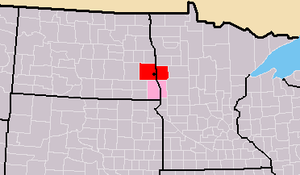Amazing! Not that “refugees” are scouting which states have more “robust” social services for them, but that there is a news article like this one that basically makes it sound perfectly normal to do so. Although, one definite plus for the article is that the reporter refers to Lutheran Social Services as having been “contracted” to resettle refugees. Glad to see the mainstream media noting that these church groups are federal contractors! That is a step in the right direction and not something we would have seen mentioned five years ago!

And, would someone on the Open Borders side of this debate please explain what “vibrant diversity” is and how it benefits American citizens besides some mumbo jumbo about how we can appreciate the world better by having aliens living next door.
From Fergus Falls Journal:
MOORHEAD, Minn. — Husni Hassan and his family left the unrest of Iraq and moved to Texas two years ago. There, he found peace, but something was missing.
“It was very hard to find somebody from your culture who speaks your language,” said the 33-year-old from the Kurdistan region of Iraq.
Hassan wanted his young children to grow up around other Kurdish people and enjoy the benefits of a close-knit community. So not long ago, when he learned of the roughly 1,100 Kurds living in Moorhead, he and his family resettled here and became part of the city’s small collection of refugees. [O.K.so what about the America community they have inserted themselves into—are Americans allowed to have close-knit American communities?—ed]
Like Hassan, many of the refugees in Moorhead lived somewhere else in the U.S. before migrating here. A low number come straight to Moorhead, often to be close to relatives or friends.
In the past few years, just 32 newly arrived refugees, all from Iraq, have landed in Moorhead. Compare that with Fargo, where close to 1,000 have settled during the same time, according to data from Lutheran Social Services, a nonprofit group contracted by the government to aid refugees.
One explanation for the drastic difference is that LSS can provide five years of services to refugees in Fargo. But in Moorhead, those services end after 90 days. [I don’t know what this five years is in reference to—ed]
[***Update*** A reader asked me a very logical question—if, as we are repeatedly told, refugees are self-sufficient in an incredibly short time, why do they need “services” for five years? Good question!—ed]
“Then they’re kind of on their own,” said Darci Ashe, an LSS spokeswoman.
In Moorhead and Fargo, refugees are eligible for federal cash assistance for eight months after they arrive in the U.S. Though those payments vary – and are somewhat higher for a single person in North Dakota – Minnesota generally has more robust benefit programs.
But services, such as a caseworker to help a refugee who doesn’t speak English make a doctor’s appointment or enroll a child in school, are available longer in Fargo than Moorhead because of basic differences in how the two states’ systems of helping refugees are designed.
This article is well-worth reading. It discusses Wilson-Fish as ND is a W-F state (see our FAQ on W-F here just a few days ago) and it tells us that the extent of medical care/medicaid for refugees is a deciding factor when refugees scout out new places to migrate.
Despite the five years of services LSS can offer refugees in Fargo, Newzad Brifki, a leader in the Kurdish community, said he believes that in the long run, Minnesota provides refugees with more support than North Dakota.
No doubt Brifki would like more refugees to resettle in Moorhead and he must be wishing his new organization (Kurdish Community of America) could get the contract to bring them there!
Brifki said he thinks Moorhead would gain much by having more refugees.
“I know Fargo is benefiting a lot from these newcomers,” he said.
“Having a diverse city is just – it’s vibrant.”
By the way, both North Dakota (hatchet-man and machete-man in the same month!) and Minnesota have had their share of diverse immigrant crime cases—but I guess he doesn’t mean that sort of diversity!
